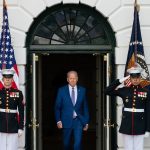In the great state of Michigan, the race for the U.S. Senate is heating up, with the candidates boasting differing philosophies on labor and economic policy—all while showcasing their unique takes on the rapidly electrifying automobile industry. On one hand, there’s Democrat Rep. Elissa Slotkin, whose labor policy reads like a Christmas wish list for unions, and on the other, former Republican Rep. Mike Rogers, who believes America needs to step back and let the free market get things back on track.
Slotkin’s campaign claims she’s all about the “dignity” of jobs, and her pledge to support domestic manufacturing seems more like a propaganda slogan than an actual plan. Taking a cue from the Biden administration, she champions the electric vehicle (EV) movement, which she believes will not only create American jobs but also provide a significant handout to union supporters. After voting for the $2.2 trillion Build Back Better Act—a financial monstrosity that most experts agree is better suited for a Monopoly game than real life—she has secured a treasure trove of union endorsements. Is it a surprising coincidence that these endorsements come from groups benefiting from the same government spending? Unlikely.
Michigan U.S. Senate candidates clash on EVs in labor policy visions https://t.co/MdVvFNyCeV
— Washington Examiner (@dcexaminer) September 3, 2024
Rogers, in stark contrast to Slotkin’s union-heavy approach, believes in the unsung hero of the economy: innovation. With his past experience in Congress and as a state senator, he has proven that reducing government regulation is the key to unleashing the creative and industrious spirit of American businesses. Instead of pushing through with government-mandated EV goals like Slotkin, he argues for a more balanced approach that allows Michigan’s auto industry to thrive without being shackled by an overzealous political agenda.
To further shake things up, Rogers offers a troubling insight into the reality of the global supply chain for EVs—over 80% of the materials needed for EV batteries come from China. Instead of giving in to a narrative that has America surrendering its car industry to a country that has little regard for fair trade practices or national interests, he insists on letting market dynamics dictate the future of U.S. auto manufacturing. Slotkin’s strategy may sound nice at first, but in practice, it could lead to a one-way ticket straight into economic dependency on the Chinese Communist Party.
For those keeping track, Rogers is also voicing concern over the EV battery manufacturing plant in Big Rapids, backed by a company with suspicious ties to China. Slotkin’s endorsement of such a project is baffling, especially when national security and economic independence are on the line. How many more reasons are needed to question whether a politician’s loyalty lies with American workers or with foreign interests?
Despite this ideological battle, recent polls have shown Slotkin leading Rogers by a slim margin—47% to 41%. But as the race continues to unfold, it’s clear that Michigan voters face a contrast unlike any other when it comes to crafting their economic future. The stakes are high, and the direction of American labor and innovation hangs in the balance.




